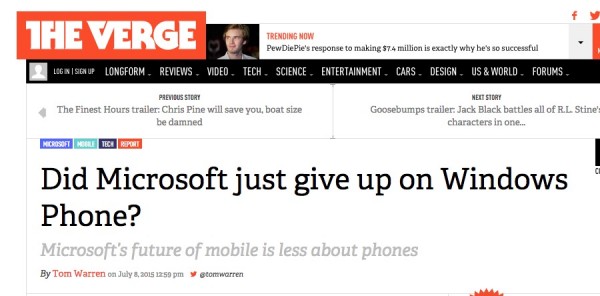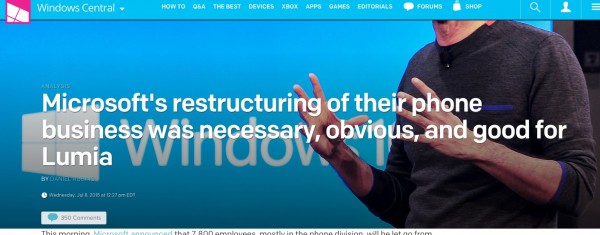Microsoft on their Windows powered phones – did they give up or is it good for Lumia?
 A couple of key posts on yesterday’s news. On the one side there’s Tom Warren from TheVerge’s Microsoft guy (who had to switch to iPhone due to exasperations with WindowsPhone) and the Arch Bishop of Winphans, Daniel Rubino.
A couple of key posts on yesterday’s news. On the one side there’s Tom Warren from TheVerge’s Microsoft guy (who had to switch to iPhone due to exasperations with WindowsPhone) and the Arch Bishop of Winphans, Daniel Rubino.
Despite Warren’s headline questioning whether WindowsPhone has been abandoned by Microsoft, he does agree Microsoft will continue investing in their own first party phones, which because it’s now unified with Windows, can continue development with less pressure from investors. Nevertheless, it doesn’t inspire confidence for TheVerge:
It feels like Microsoft is admitting defeat and readying itself for a different kind of mobile future instead of worrying about the smartphone war it will never win.
http://www.theverge.com/2015/7/8/8913365/microsoft-lumia-windows-phones-strategy-2015
On the flip side, the WindowsPhone fans will try to find something positive (as we tried to with all Nokia things, finding other sides to the stories).  Rubino reiterates that Microsoft is committed to their own phones, going as far as saying all this restructuring is good for Lumia.
Rubino reiterates that Microsoft is committed to their own phones, going as far as saying all this restructuring is good for Lumia.
There is no real positive way to spin the write-down news, but it is also not unheard of in business. Nor is it clear what the alternative to buying Nokia at the time would have been.
http://www.windowscentral.com/microsofts-restructuring-their-phone-business-was-necessary
Going back in time, Rubino says that buying Nokia’s D&S was the best option for Microsoft and their WindowsPhone platform. Had Nokia gone all out Android or gone to a competitor, they would have lost the maker that accounted for 97% of WindowsPhones, the one that began to get attention back to Microsoft powered phones and all this could have potentially worked against them.
Rubino reminds us of his post on June 30th where he was all for Microsoft cutting back on their Lumia portfolio, with overlapping features and price points. Yesterday, Nadella said he wanted a more focused and aligned resources. Nokia was there for a revival of their smartphone lineage. Microsoft was in it to create an ecosystem for their services. Nokia did sell more WindowsPhones than anyone. The challenge from HTC or Samsung wasn’t a threat at all, in fact it was all too easy for Nokia which perhaps for Microsoft meant they were difficult to control (and how could you keep enticing competitors to your platform). It’s no surprise since Nokia was the undisputed NUMBER ONE in phones and smartphones, a leading innovator for so many years. You cannot keep a giant like this down when they start executing things properly and for the initial parts of the WindowsPhone strategy, they kinda did that.
Rubino goes on to attack articles claiming WindowsPhone is getting dumped:
Despite all the terrible and uninformed articles written in the last weeks of June, Microsoft is not “dumping” Windows Phone, selling off their Lumia hardware division, nor switching to Android. Of course, the damage is done with many laypeople now believing such tripe.
http://www.windowscentral.com/microsofts-restructuring-their-phone-business-was-necessary
Nadella wants to grow the Windows Ecosystem which includes their own first party devices. For their phones, there are three clear segments:
- Business
- Value
- Flagship
There are many, many Lumias that cater for each of these (well maybe no longer number 3.). Rubino wants Microsoft back into enterprise (and not simply Lumias that can be business phones too) with first class business phones. He mentions again that high end flagships are coming and these are Microsoft’s way of highlighting all the new features of Windows 10, just like what Surface did for Windows 8. And of course, the bread and butter, quality budget WindowsPhones.
Another WC article says Microsoft will still be making their phones for at least two years. Whilst this does sound positive, this kind of story reminds me of Nokia stories as they were winding down.
Other points:
We should give some Kudos to Nokia who put their all into WindowsPhone. They also played to their strengths and filled all the price points with Nokia Lumia handsets. If it weren’t for them, I wouldn’t be seeing so many Lumias in everyday consumer hands today. As pointed out by commenters, WindowsPhone was great but it was missing so many key features that could have propelled them even further. This led to Nokia having to plug these holes until there was a better native solution.
Another interesting comment suggested that instead of a Microsoft buy of Nokia, they could have provided a couple more billion to further strengthen Lumia line, with additional incentives to prevent Nokia going Android.
What’s gonna happen to all those people who have lost their jobs? Majority being from the phone business (ex Nokians) and a reported 2300 being from the R&D department in Finland. Maybe original yet NEW Nokia can take a few back for their Advanced Technologies segment or even put in teams for their supposed new Nokia Android?
Category: Lumia





Connect
Connect with us on the following social media platforms.